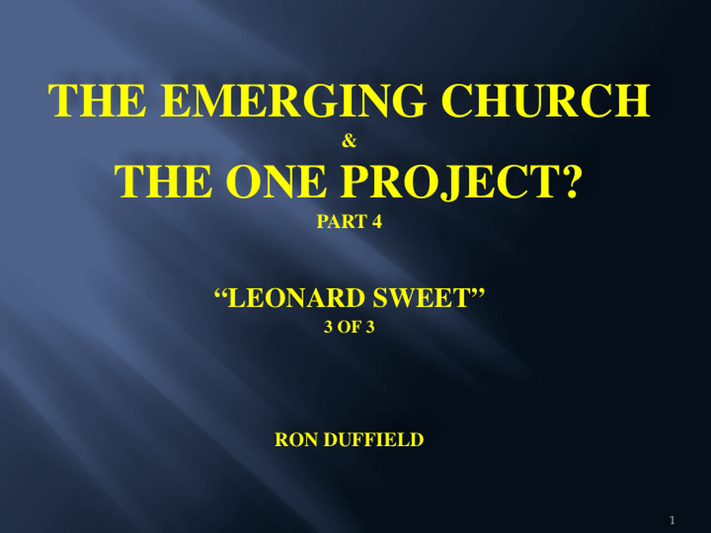
My study into the emerging church started when a pastor back East asked if I knew anything about “The One Project”. When I began to study into the history of the Project and those who started the movement, I was lead to enquire about the Emerging Church and its teachings and history. I found that it deals with much more than just “spiritual formation” and “centering prayer.”
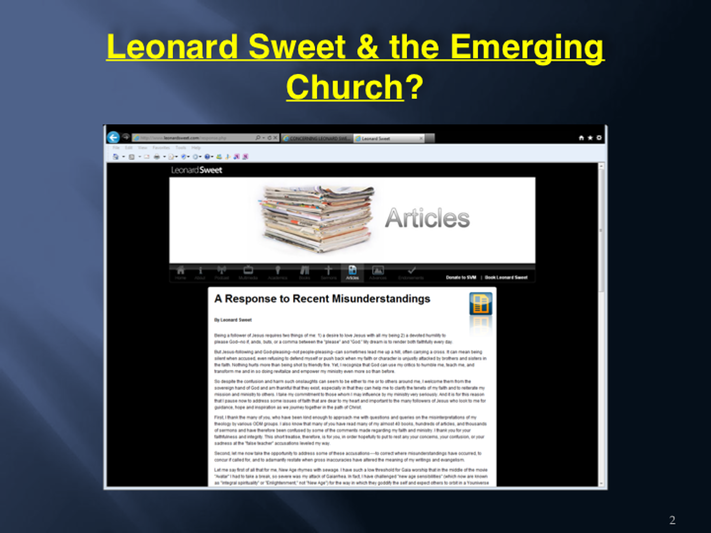
Sometime in the spring of 2010 Leonard Sweet wrote a response to criticism about his association with New Age and Emerging Church ideas. His response should be educational especially in light of what is being promoted in our SDA schools. There are similar arguments made by those pushing the Emerging Church movement in our church which can easily blow off those with legitimate concerns.
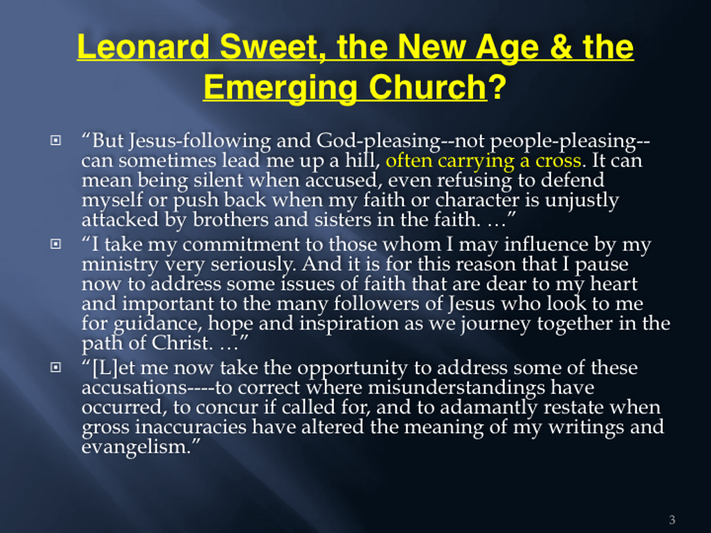
The I am being persecuted argument.
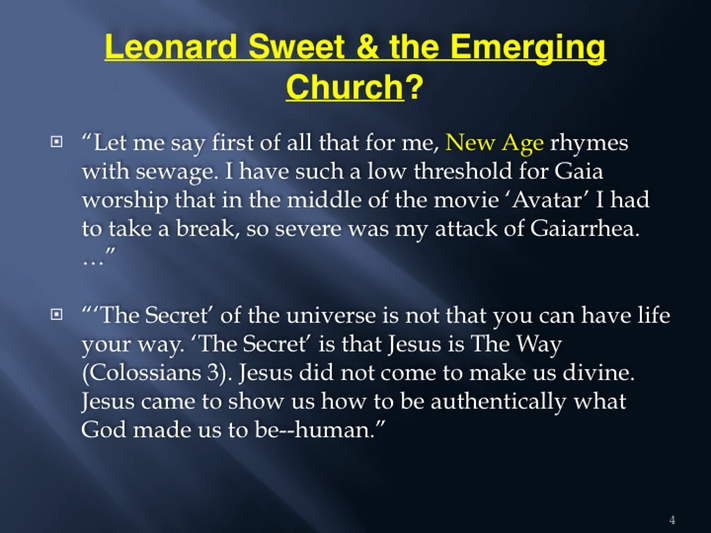
Gaia was the goddess or personification of Earth in ancient Greek religion.
Sweet’s claims don’t line up though with other books he wrote the same year (2010). If he truly had such a problem with New Age, pantheistic ideas, why does he quote so much from those with these beleifs?
Notice that similar claims are made today by those pushing new views into the SDA church. Also remember that Kellogg claimed he was doing nothing wrong. He claimed he was not writing about that which Ellen White accused him of, and that he was only writing what she had been writing about for years.
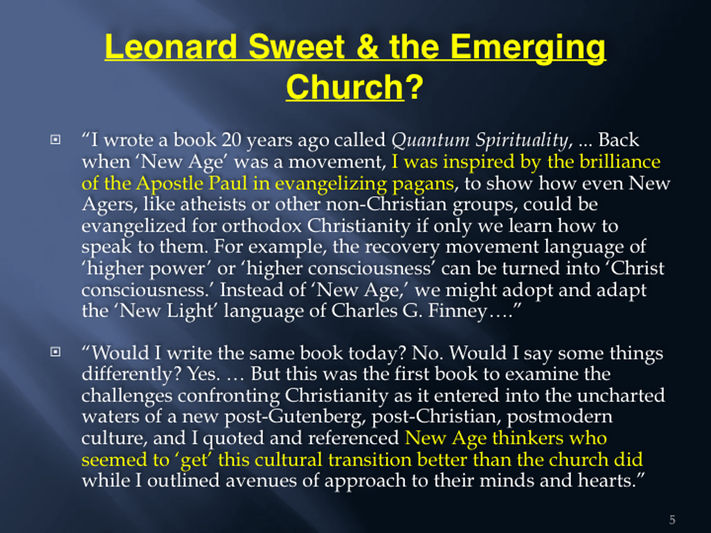
These are straw men responses, and don’t really answer the true issues at stake. Plus it appears that Sweet hasn’t changed his underlying philosophy, only the words he uses to present it, thus making it more subtle.
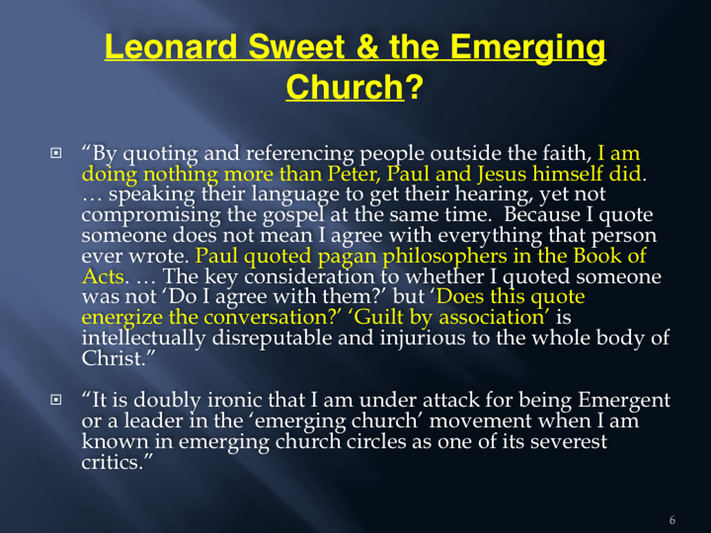
Sweet quoted New Age authors as authorities in Quantum Spirituality. This is not an issue of “guilt by association.” He continues to do the same in many of his newer books as well. Sweet would be hard put to claim he was not part of the Emerging Church Movement. For him, like many others, he seems to have no problem with the Ecumenism prophesied in Revelation, which would take place right before Christ return.
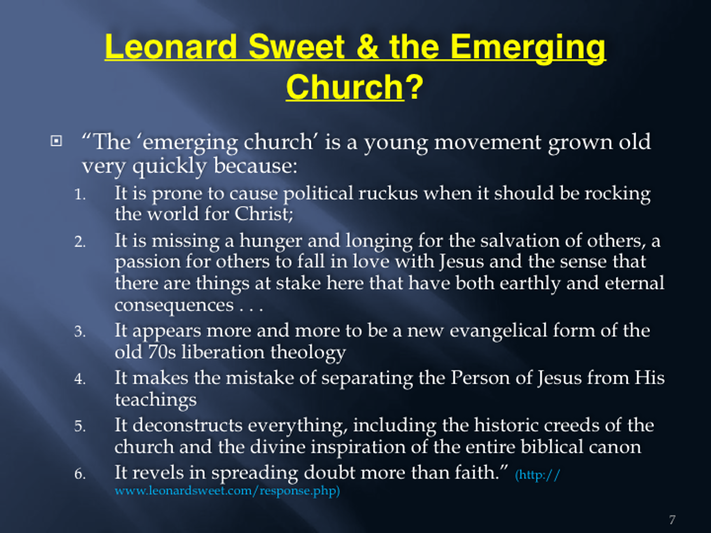
Sweet’s description of the Emerging Church Movement is fairly accurate. Unfortunately he does not seem to see how he has in the past and is at present supporting the movement through his associations and books.
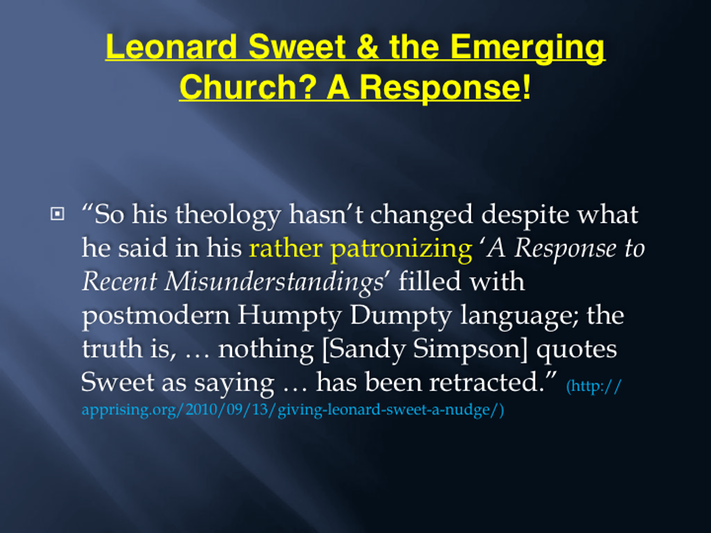
Pastor Ken Silva responded Sept. 10, 2010, on the website “Apprising Ministries: Awakening to the Light of Scripture”. Ken Silva refers to “Sandy Simpson” and an article he wrote detailing quotes form Leonard Sweet’s recent books which shows Sweet has not changed. (http://apprising.org/2010/09/13/giving-leonard-sweet-a-nudge/). Ken Silva then quotes from a recent tweet by Sweet which also shows that his “Response” didn’t change the ambiguous way he has been writing and speaking as of May 12, 2010. (see next slide)
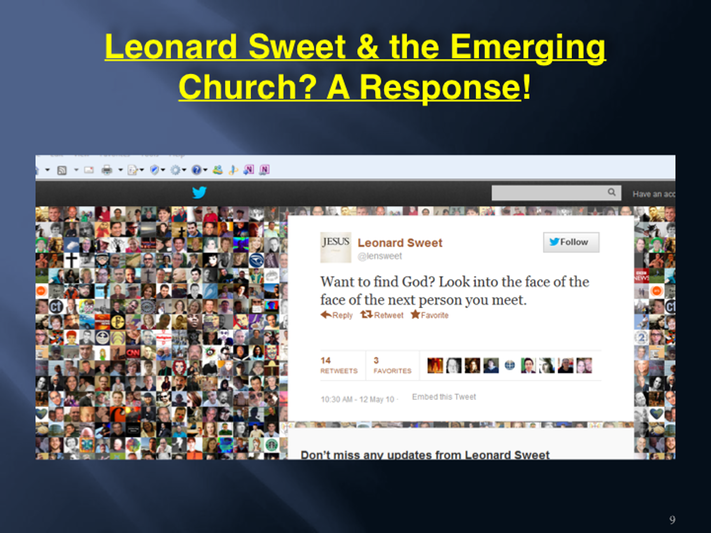
Ken Silva then quotes from a recent tweet by Sweet which also shows that Sweet’s “rather patronizing” Response didn’t change the ambiguous way he has been writing and speaking and tweeting as of May 12, 2010. Sweet’s tweet itself images his book Jesus Manifesto which has New Age, Emerging Church concepts. Thus Sweet has not really changed.
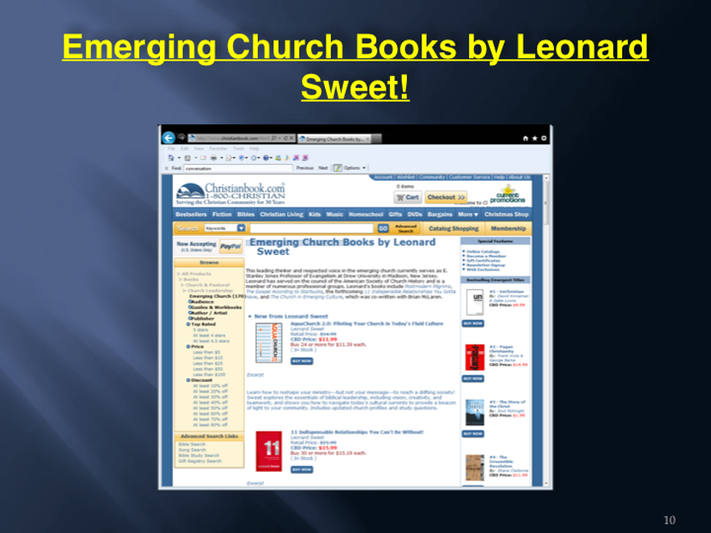
Again, as of Oct. 2012, we still find this listing on Christianbook.com, advertising Sweets books under the Emerging Church Books section. If Sweet has nothing to do with the Emerging Church movement then why all these books listed here?
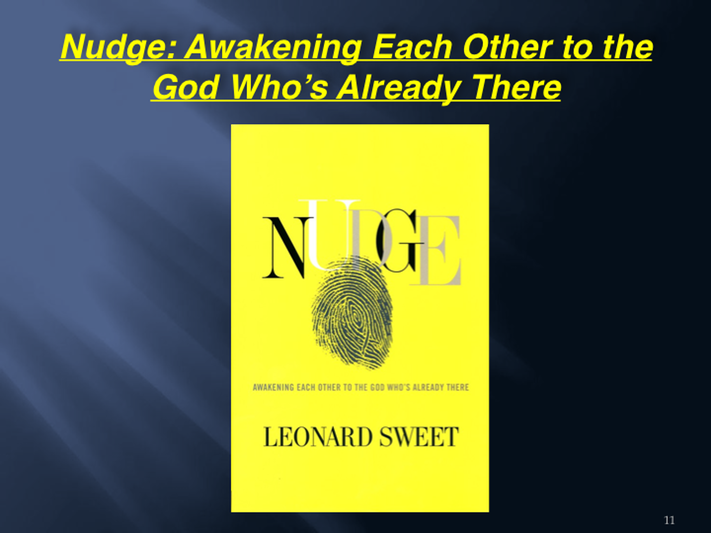
Nudge: Awakening Each Other to the God Who’s Already There, Sept. 2010 release. Notice the interesting illustration of a fingerprint representing Christianity, already imbedded in our finger print. What does this mean?
For an interesting response to this book, look up: (http://apprising.org/2010/09/13/giving-leonard-sweet-a-nudge/)
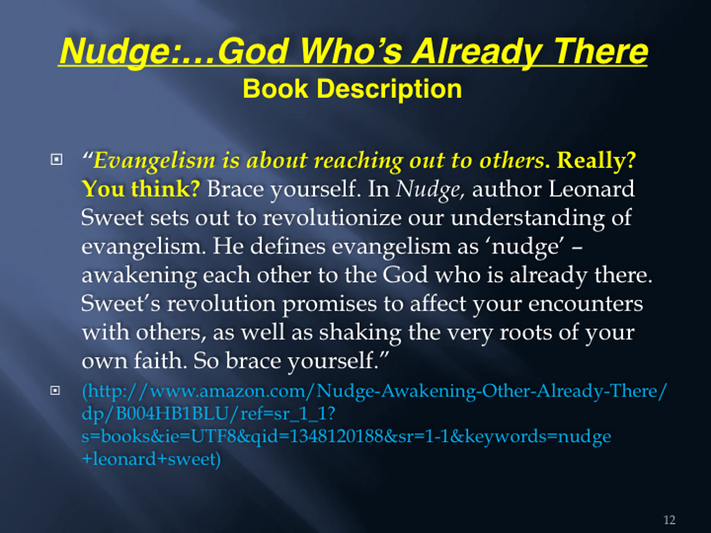
Sweet has some good points in this book. Sweet suggests that we think we are taking Jesus to share with someone, when in fact Jesus has already been working in that persons life, but some of his concepts go too far, a mixture of truth and error.
As typical of many Emerging books, the book description starts by questioning evangelism; starts with a statement of doubt. “Really? You think?”
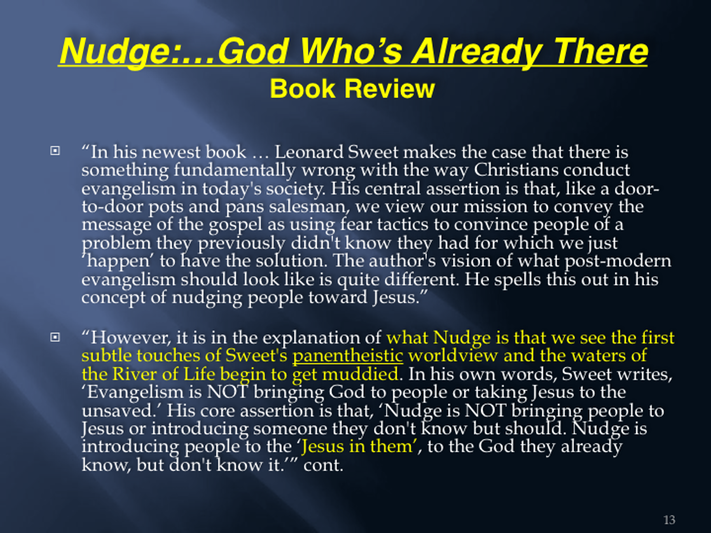
Pantheism once again.
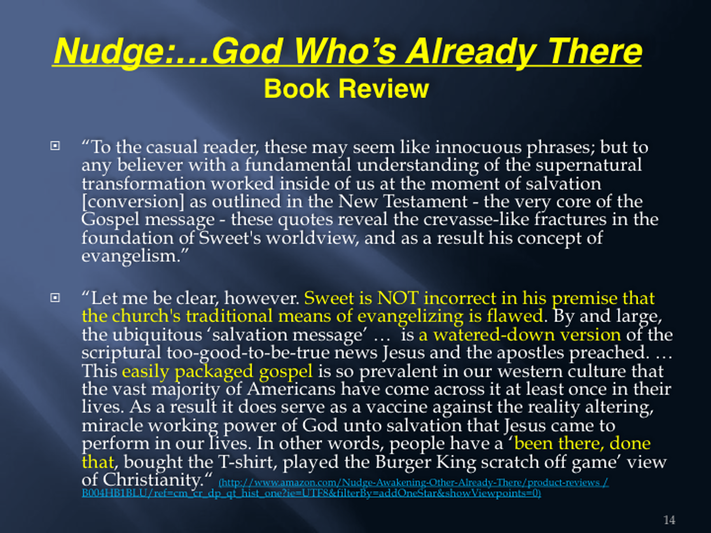
Notice next slide that gives warning writing by Ellen White.
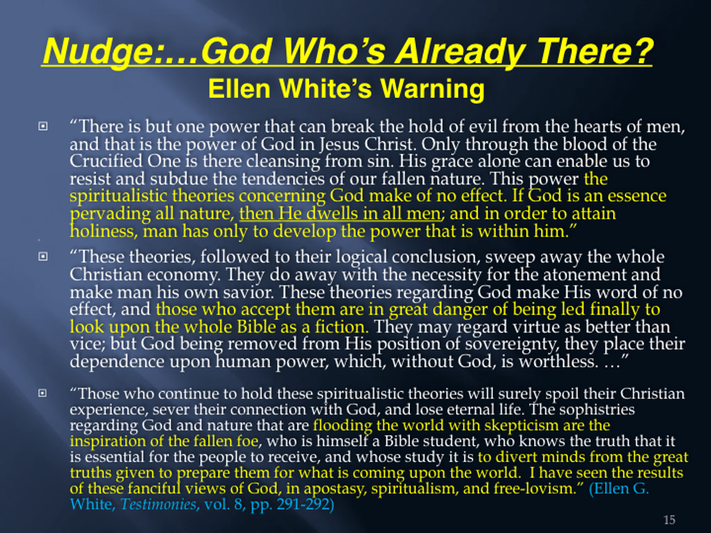
Ellen White warned about this very idea of God dwelling in all men and what the results would be. Should we listen to the warning God has given us?
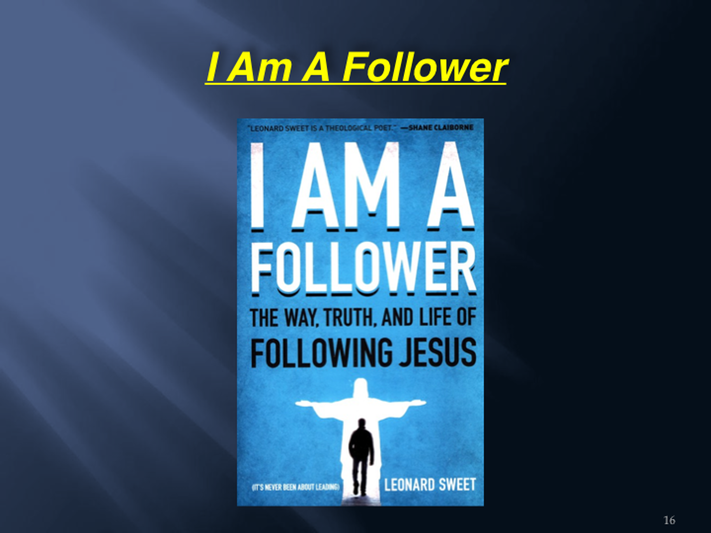
I Am A Follower: The Way, Truth and Life of Following Jesus, Jan. 2012;
Notice: “Leonard Sweet is a theological poet.”—Shane Claiborne. (on cover)
“Its never been about leading”. (on cover at bottom).
One of the books given out at Seattle Gathering of The One Project.
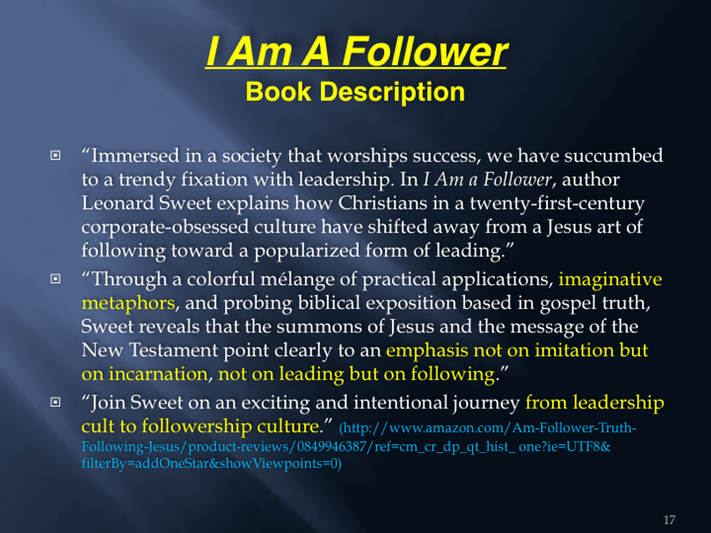
I Am A Follower: The Way, Truth and Life of Following Jesus, Jan. 2012;
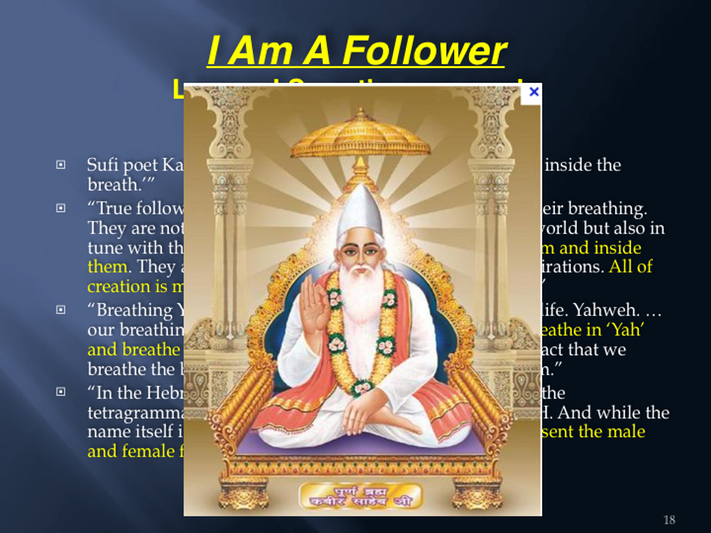
Following are 3 slides on Sweets pantheistic ideas found in this book.
But we should once again allow Sweet to speak for himself and compare his philosophy in 2012 with that found in his first book Quantum Spirituality. In his “Bigger Upper Rooms” chapter we find the following intro poem and content.
“Kabī (1440-1518) was a mystic poet and sant of India, whose writings have greatly influenced the Bhakti movement. The name Kabir comes from Arabic al-Kabīr which means 'The Great' – the 37th name of God in Islam. Apart from having an important influence on Sikhism, Kabir's legacy is today carried forward by the Kabir Panth (‘Path of Kabir’), a religious community that recognizes him as its founder and is one of the Sant Mat sects. Its members, known as Kabir panthis, are estimated to be around 9,600,000. Kabir was influenced by the prevailing religious mood of his times, such as old Brahmanic Hinduism, Tantrism, the teachings of Nath yogis and the personal devotionalism of South India mixed with the imageless God of Islam.[11] The influence of these various doctrines is clearly evident in Kabir's verses. Eminent historians … have held that Kabir is the first Indian saint to have harmonized Hinduism and Islam by preaching a universal path which both Hindus and Muslims could tread together.[12] … collection of poems elucidates Kabir's universal view of spirituality. Though his vocabulary is replete with Hindu spiritual concepts, such as Brahman, karma and reincarnation, he vehemently opposed dogmas, both in Hinduism and in Islam. … He often advocated leaving aside the Qur'an and Vedas and simply following Sahaja path, or the Simple/Natural Way to oneness in God.” (http://en.wikipedia.org/wiki/Kabir)
This is contemplative prayer. Breathe prayer, Yoga, eastern meditation technique.
[Footnote 4] The male and female idea of God is taken by Sweet from: Gillia Nissan “A Monotheistic Model of Love,” Parabola, 35 (Spring 2010) p. 9. [Parabola Magazine: A quarterly print magazine about the study of the myths, rituals, symbols, and arts of the world's spiritual traditions. Filled with mystical, eastern religious ideas]. The magazine offers no reference to the quote but was probably taken from Matthew Fox’s The Hidden Spirituality of Men: Ten Metaphors to Awaken the Sacred Masculine, p. 324 (2009), or from what seems to have been its origin, Aryeh Kaplan’s, Jewish Meditation: A Practical Guide, chpt. 17, (1995). This book is a Jewish guide in spiritual formation, contemplative prayer, etc.
Aryeh Kaplan (1934-1983) was a noted American Orthodox rabbi and author known for his "intimate knowledge of both physics and kabbalah.
Kabbalah, (Hebrew: קַבָּלָה literally "receiving"), is an esoteric method, discipline and school of thought. Its definition varies according to the tradition and aims of those following it,[1] from its religious origin as an integral part of Judaism, to Christian, New Age, or Occultist syncretic adaptions. At the heart of Kabbalah religion is a mystical symbol called “Sephirot” or sometimes called the “tree of life”. Sephirot, meaning "enumerations", are the 10 attributes/emanations in Kabbalah, through which Ein Sof (The Infinite) reveals himself and continuously creates both the physical realm and the chain of higher metaphysical realms. This symbol is full of the female/male ideas found in the original statement by Sweet. (See wikipedia for all this info)
Sweet also quotes in this chapter from: “Steve Crabb, ‘Wake Up and Smell the Roses,’ NLP (Neuro-Linguistic Programming) Master Class, PDF document downloaded from Adventesi Free Resources, http://www.aventesi.com.”
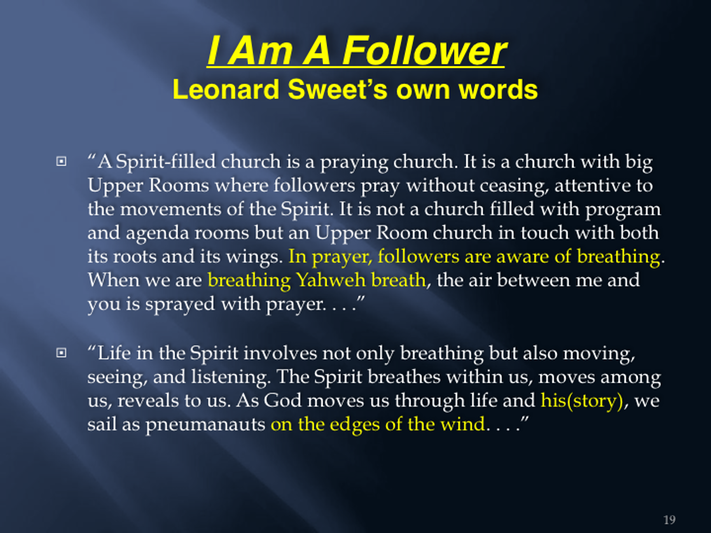
On the following page, Sweet seems to start the paragraph out good but then continues the same thoughts as before making it clear that he is connecting these ideas with contemplative, centering prayer so common among the Emerging Church movement. Also pits programs and agendas or plans against prayer, Why?
“his(story)” is another catch phrase of the movement.
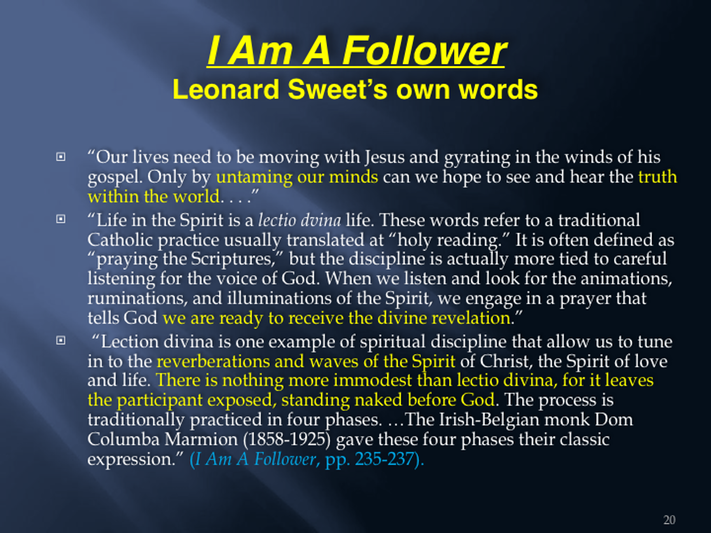
“What is the Lectio Divina? The word Lectio Divina is Latin for ‘divine reading,’ ‘spiritual reading,’ or ‘holy reading’ and represents a method of prayer and scriptural reading intended to promote communion with God and to provide special spiritual insights. The principles of lectio divina were expressed around the year A.D. 1620[?] and practiced by Catholic monks, especially the monastic rules of Sts. Pachomius, Augustine, Basil, and Benedict.
Today, this practice that has been kept alive in the tradition of Benedictine monastic’s and it’s not only popular among Catholics, it has gained acceptance in other faiths and, more recently, in the emerging church. Today it is better know as contemplative prayer. …
In order to practice lectio divina, select a time and place that is peaceful and in which you may be alert and prayerfully attentive. Dispose yourself for prayer in whatever way is natural for you. This may be a spoken prayer to God to open you more fully to the Spirit, a gentle relaxation process that focuses on breathing, singing or chanting, or simply a few minutes of silence to empty yourself of thoughts, images, and emotions. …
The Lectio Divina has the potential to become, and often does become a mystical experience pursuit in which the goal is to empty the mind and freely empower oneself unknown sub conscience powers . While the Christian’s often try justify the use of the Lectio Divina because of use Scriptures to pursue the knowledge of God, wisdom, and holiness in this prayer method. This however does not mean that the end justify the means.” (http://www.empoweredbychrist.org/-what-is-the-lectio-divina.html)
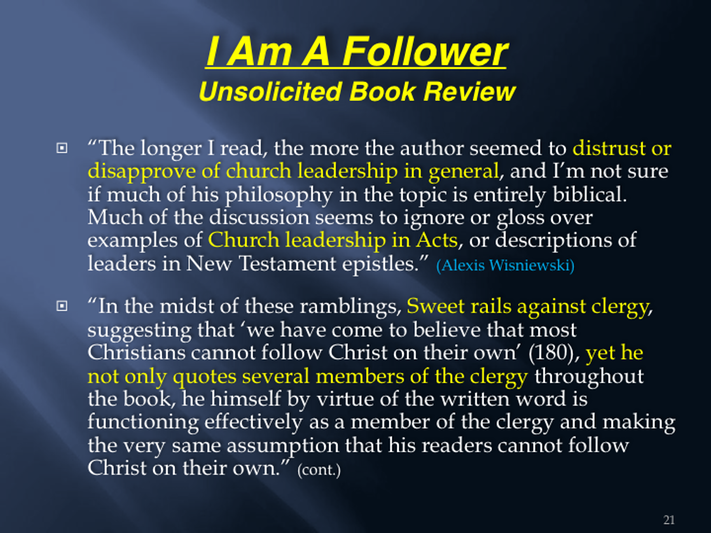
Alexis Wisniewski and Keith Clark reviewers.
What clergy is Leonard Sweet quoting from? The issue seems to be not with clergy, but clergy that don’t agree with the Emerging church movement.
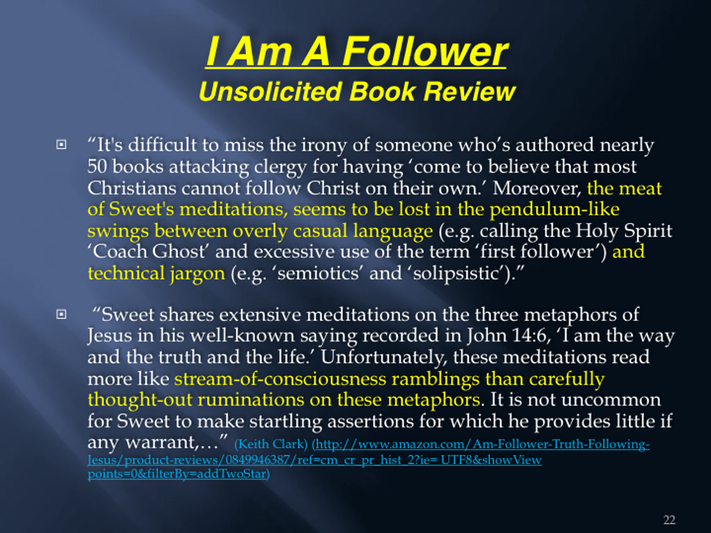
Keith Clark continues:
“‘Streams-of-consciousness’ is new age/spiritualistic thought couched in pseudo-religious language. … It is not uncommon for Sweet to make startling assertions for which he provides little if any warrant, such as his attack on the focus on spiritual giftedness (pp. 161-169), or his claim that ‘the new relationality of the localized and organic . . . is creating a web of strength and a fortress of freedom that won't be broken or pulled asunder’ (p. 176), or his discussion of New Testament notions of priesthood and church polity (pp. 174-178), or his baseless contention that ‘the major fruit of the Spirit is joy’ (p. 252). Really?”
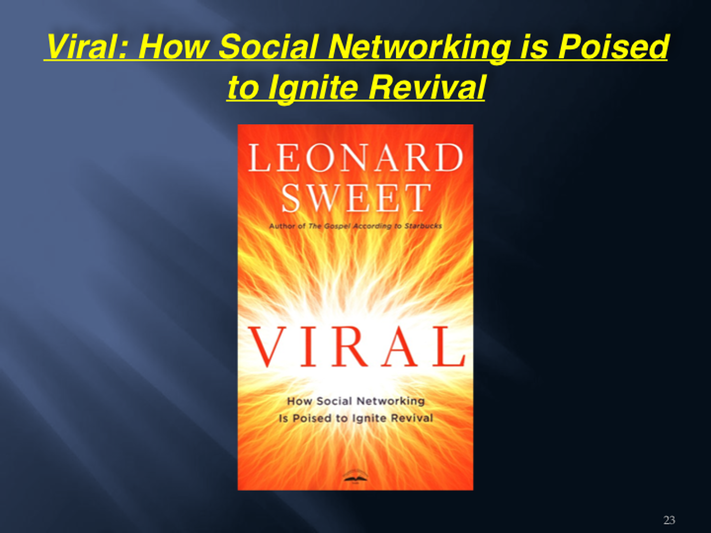
Viral: How Social Networking is Poised to Ignite Revival, March 2012, too early to have reviews on the book.

The Voice Bible, April 2012. Sweet was one of 120 scholars that contributed to produce this paraphrased Bible.

April 2012. (new testament only was published in 2011) Sweet was one of 120 scholars that wrote this paraphrase Bible.
Some of the reviews of this paraphrase are not so glowing:
“Even more alarming is John 6:39 , The Voice: ‘He sent Me to care for all He has given Me so that nothing and no one will perish. In the end, on the last day, He wants everything to be resurrected into new life.’” (http://www.amazon.com/The-Voice-Bible-Story-Scripture/product-reviews/1418549010/ref=cm_cr_pr_hist_2?ie=UTF8&filterBy=addTwoStar&showViewpoints=0)
Some felt “The Voice is not a Bible. It leaves out Jesus Christ and uses New Age lingo. It's dangerous!” (http://www.amazon.com/The-Voice-Bible-Story-Scripture/product-reviews/1418549010/ref=cm_cr_dp_qt_hist_one?ie=UTF8&filterBy=addOneStar&showViewpoints=0)
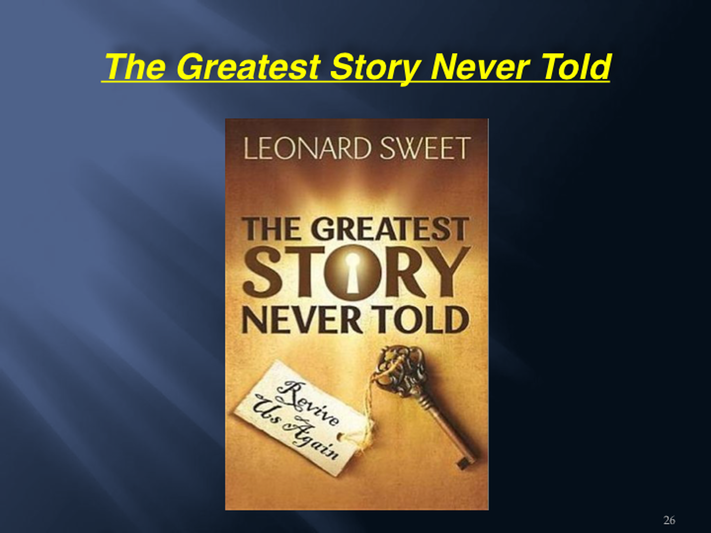
The Greatest Story Never Told, May 2012. Sweet’s book evidently written toward his Methodist church upbringings.
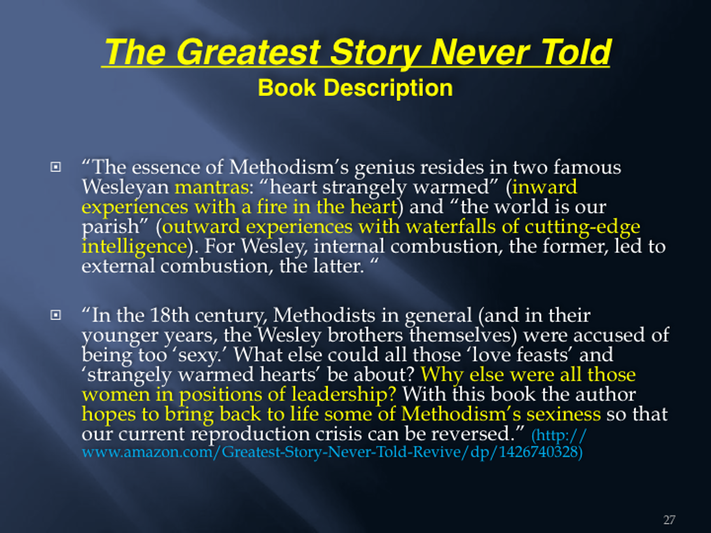
Mantra? “1. Hinduism A sacred verbal formula repeated in prayer, meditation, or incantation, such as an invocation of a god, a magic spell, or a syllable or portion of scripture containing mystical potentialities. 2. A commonly repeated word or phrase:” (http://www.thefreedictionary.com/mantra)
Sweet seems to make light of the great Wesleyan heritage of justification and sanctification by faith calling it a mantra, and adding sexual metaphors.
“At a meeting of the Moravian society in London, a statement was read from Luther, describing the change which the Spirit of God works in the heart of the believer. As Wesley listened, faith was kindled in his soul. “I felt my heart strangely warmed,” he says. “I felt I did trust in Christ, Christ alone, for salvation; and an assurance was given me that he had taken away my sins, even mine, and saved me from the law of sin and death.” (Great Controversy, 1888 ed., p. 256)
To early to have many reviews of the book.
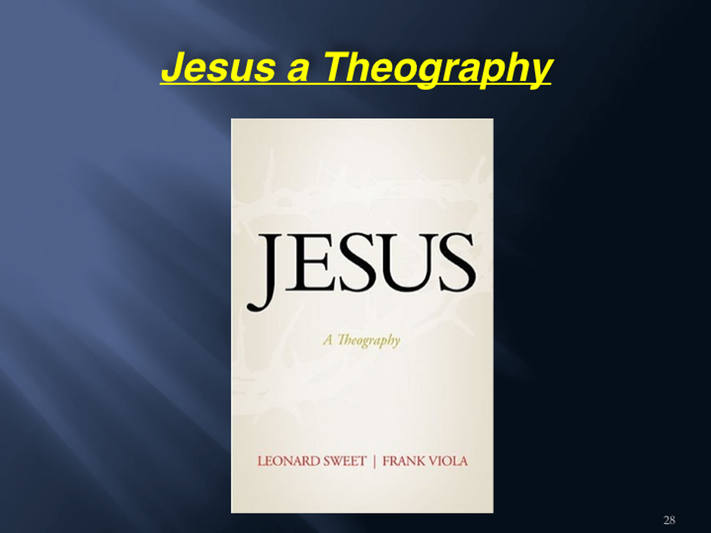
Jesus: A Theography, Oct. 2012 a book written along with Frank Viola, see presentation 3 for more on Viola’s background.
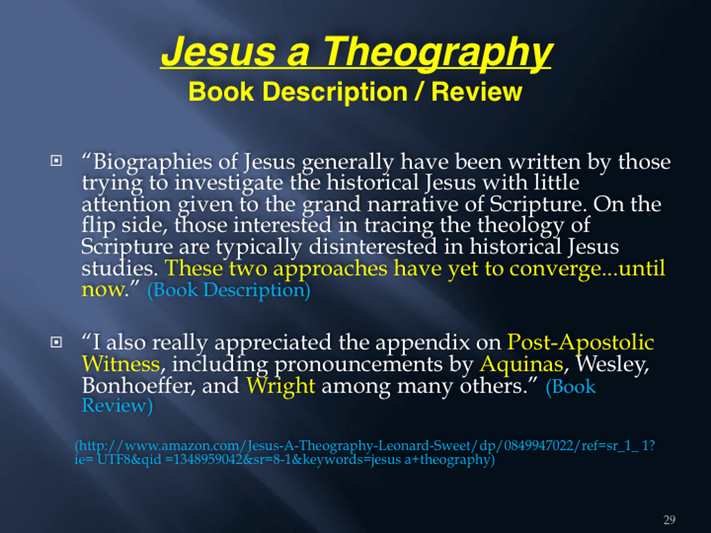
The book description makes a wild claim that no book has been written until now on the history of Jesus in the OT combined with theology of Jesus. Perhaps it is true only in the context of Emerging Church authors.
Oct. 2012, to early to have many reviews. Seems that most who have read so far give positive reviews of books revealing Christ in OT but most likely has some of the same problems as his other books, including an appendix that quotes from Aquinas, etc.
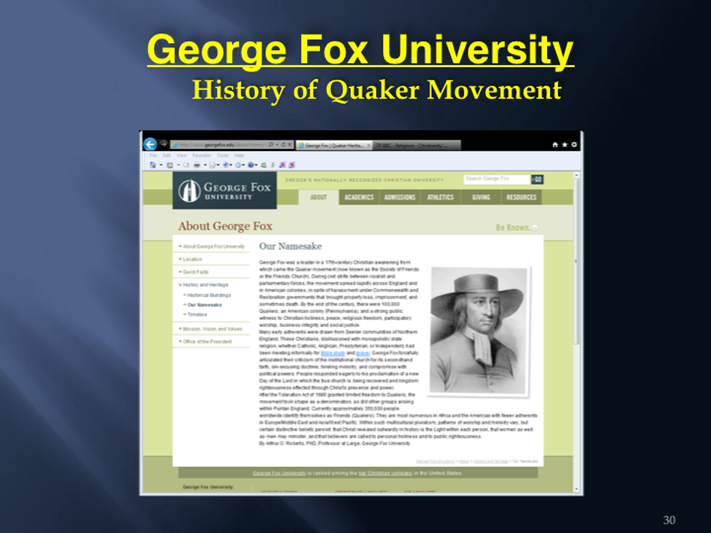
Before we look at George Fox University graduate program where Leonard Sweet is a leading professor, we need to take a look at how the George Fox University got its name.
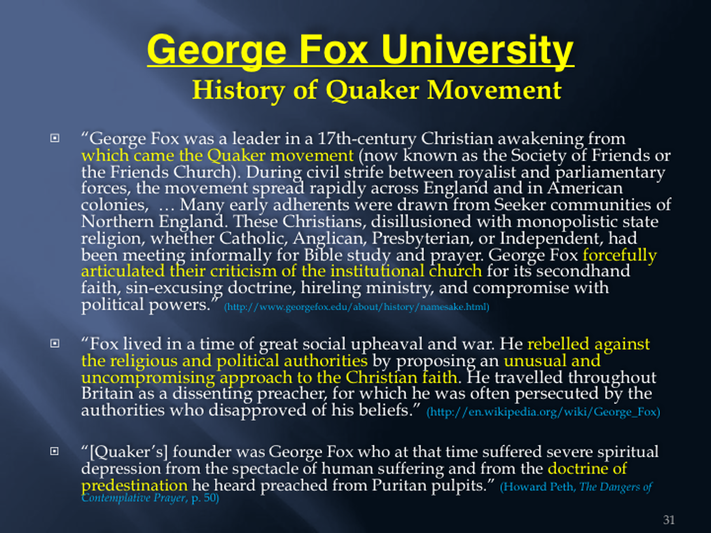
George Fox lived during time of reformation (1624-1691). George Fox was rebelling against much of the corruption of the church of Rome and of England and even Calvinism, but he went too far. It appears that modern day Quakers in some respects have rejected those aspects of George Fox that were admirable and kept and promoted those aspects that are most questionable. Fox stood for liberty of conscious, but his ideas of liberty went beyond biblical terms. Today, equal rights is defined by Quakers to mean ordination of women, and homosexual clergy. Gay marriage is accepted as a norm. Although pacifist, they are led to false views about judgment, etc. They are also becoming very Ecumenical in nature.
What Ellen White had to say about false doctrine of predestination: “The errors of popular theology have driven many a soul to skepticism who might otherwise have been a believer in the Scriptures. It is impossible for him to accept doctrines which outrage his sense of justice, mercy, and benevolence; and since these are represented as the teaching of the Bible, he refuses to receive it as the word of God.” (GC 525)
“The appalling views of God which have spread over the world from the teachings of the pulpit have made thousands, yes, millions, of skeptics and infidels.” {GC 536.2}
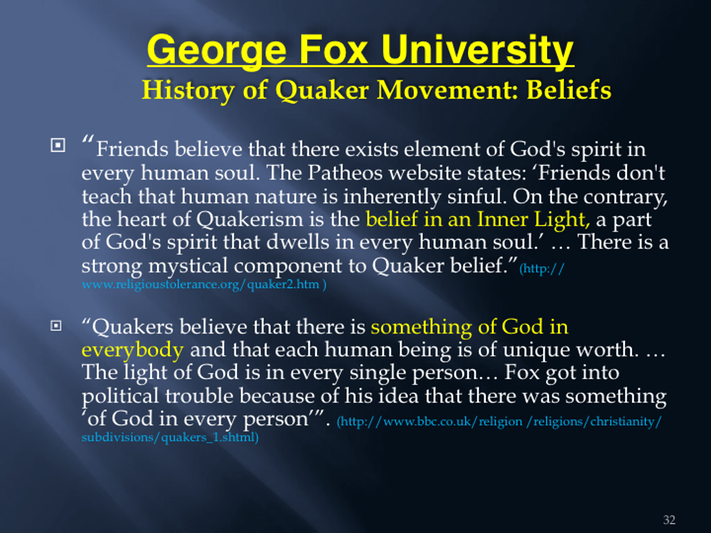
Statement of beliefs has this preface: “As with all large denominations, individual Quakers are religiously diverse. Their beliefs range from Evangelical (conservative) to liberal. The following beliefs are common to most Quakers:” Notice the false Hindu, pantheistic idea of god in all men. For Ellen White’s response to this idea see slide 15 above.
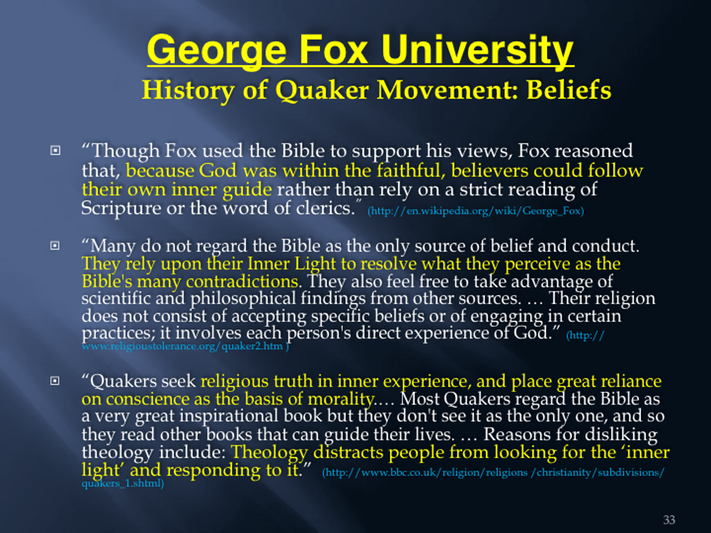
“Pantheism is the pagan belief that ‘ALL is God.’ Panentheism is its twin that says, ‘God is In everyone and everything.’ The Quakers—like the Hindus, Buddhists, and New Agers—are panentheists.” (Howard Peth, The Dangers of Contemplative Prayer, p. 50)
For Ellen White’s response to this idea see slide 15 above.
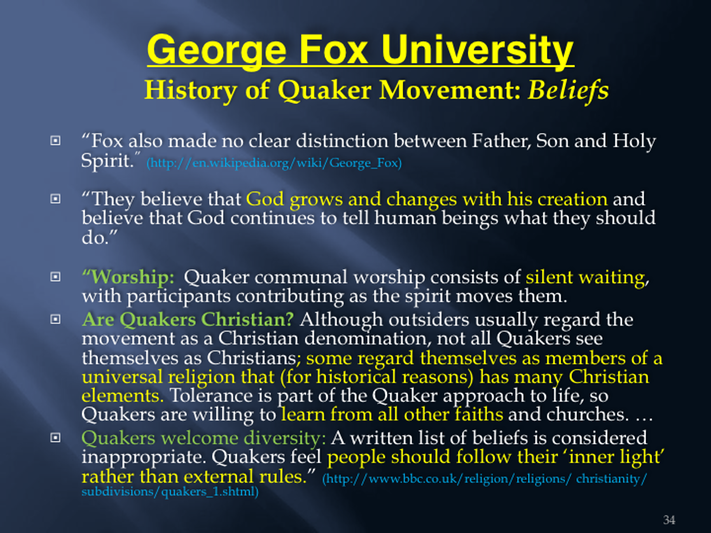
Quakers have an Ecumenical nature to their beliefs.
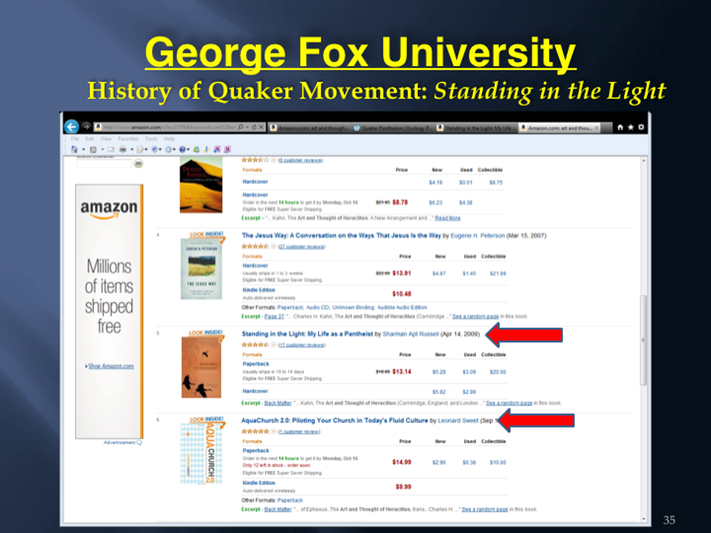
The book Standing in the Light: My Life as a Pantheist makes no bones about the life and beliefs of a Quaker who openly promotes Pantheism. It is advertised in one search on Amazon.com along side one of Leonard Sweet’s books.
http://www.amazon.com/Standing-Light-My-Life-Pantheist/dp/0465013805/ref=sr_1_4?s=books&ie=UTF8&qid=1350014859&sr=1-4&keywords=standing+in+the+light#reader_0465013805
http://www.amazon.com/s?ie=UTF8&keywords=art%20and%20thought%20of%20heraclitus&rh=n%3A12290%2Ck%3Aart%20and%20thought%20of%20heraclitus%2Cp_n_condition-type%3A1294422011&page=1
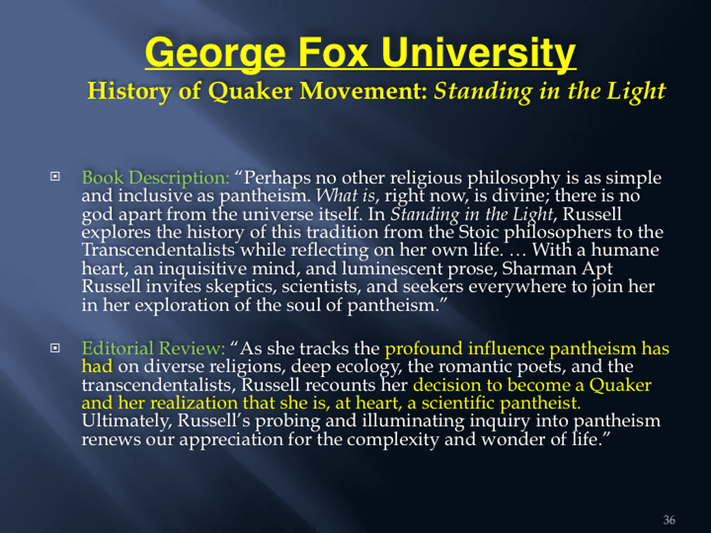
The author was raised in the suburbs of Phoenix, Arizona. “In 1981 I settled in southern New Mexico as a ‘back to the lander’ and have stayed there ever since. I am a longtime professor in the Humanities Department at Western New Mexico University in Silver City, as well as an associate faculty at Antioch University in Los Angeles. I received my MFA in Creative Writing from the University of Montana and my B.S. in Conservation and Natural Resources from the University of California, Berkeley.”
Author of Hunger: An Unnatural History (Basic Books, 2005), and many others.
Rom 1:21-25 KJV Because that, when they knew God, they glorified him not as God, neither were thankful; but became vain in their imaginations, and their foolish heart was darkened. (22) Professing themselves to be wise, they became fools, (23) And changed the glory of the uncorruptible God into an image made like to corruptible man, and to birds, and fourfooted beasts, and creeping things. (24) Wherefore God also gave them up to uncleanness through the lusts of their own hearts, to dishonour their own bodies between themselves: (25) Who changed the truth of God into a lie, and worshipped and served the creature more than the Creator, who is blessed for ever. Amen.
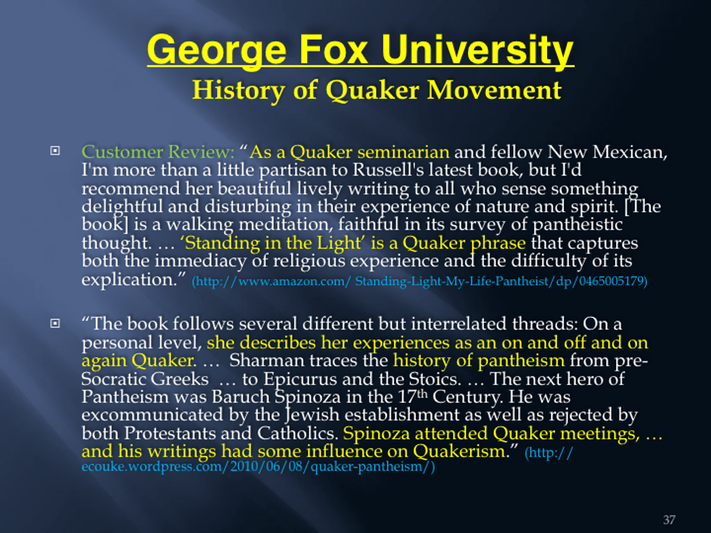
Quakerism at its core has pantheistic tendencies.
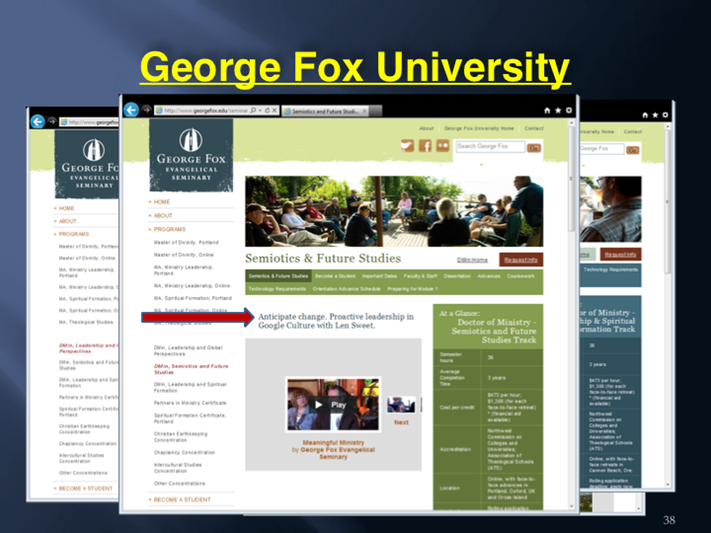
Leonard Sweet is “Currently the E. Stanley Jones Professor of Evangelism at Drew University, Madison, NJ and a Visiting Distinguished Professor at George Fox University, Portland, Oregon,…”
George Fox University which was founded by Quakers in 1885 and is located in Newberg Oregon, and has centers in Portland, Salem and Boise, ID. In 1996, the college merged with Western Evangelical Seminary to form George Fox University. Notable graduates include Richard Foster, and Dan Kimball, both big names in Emerging Church movement.
Doctor of Ministry
George Fox offers 3 Doctor of Ministry programs:
DMin in Leadership and Global Perspectives
DMin in Leadership and Spiritual Formation
DMin in Semiotics and Future Studies
Leonard Sweet, although involved in all three programs is especially in charge of the “Semiotics and Future Studies” program to which several Adventists pastors have attended and received their post-graduate degrees.
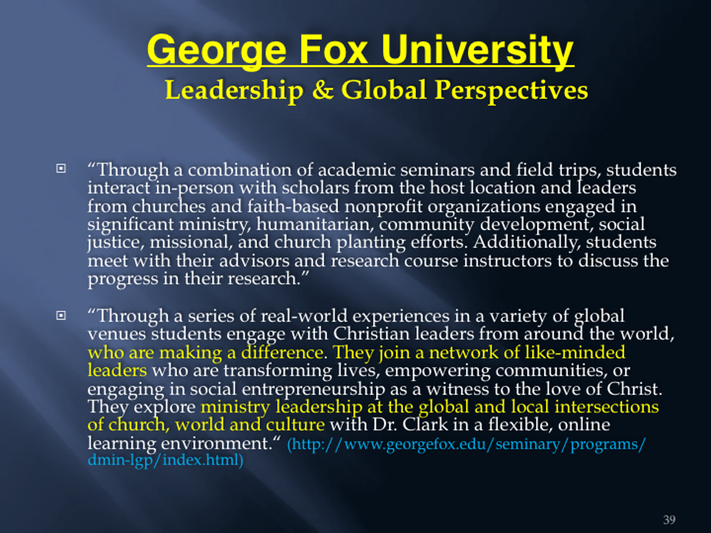
Leadership & Global Perspectives is one of the three 3 year post graduate courses. Leonard Sweet is involved in all three courses to some degree, the third we will look at he is the leading professor. Some aspects of the description of this course are not wrong in and of themselves, but in the context of the Emerging Church and what they mean by this description should be of concern.
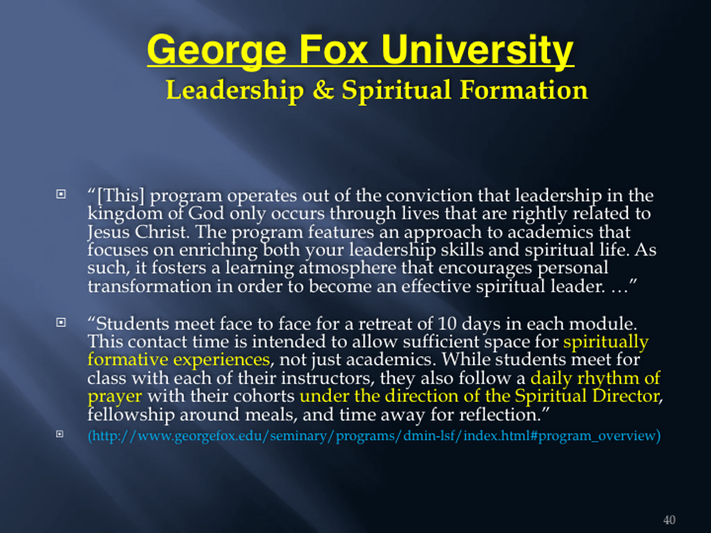
Leadership & Spiritual Formation is one of the three 3 year post graduate courses. Leonard Sweet is involved in all three courses to some degree, the third we will look at he is the leading professor. Once again some very appropriate descriptions of what a true leader should be. But in the context of Emerging Church philosophy there are some serious dangers here.
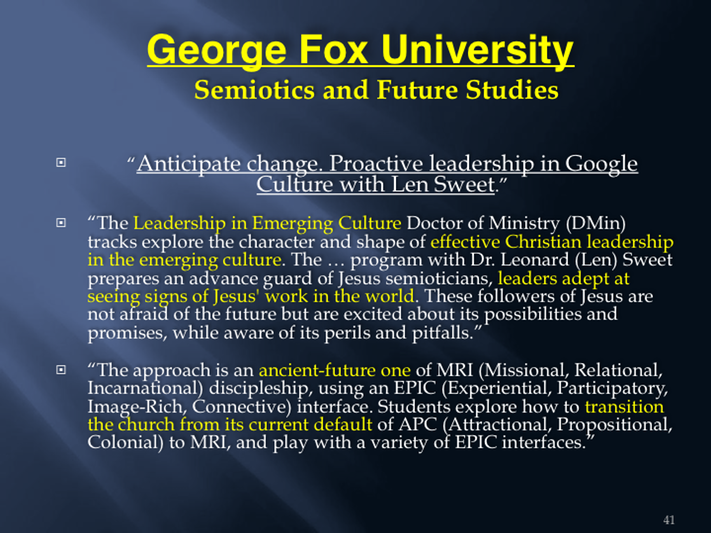
The Leadership in Emerging Culture Doctor of Ministry (DMin), also called Semiotics and Future Studies, is the 3rd doctoral program at George Fox University and is led by Leonard Sweet. “Anticipate Change” is the heading on the web listing for this course.
Definition of SEMIOTICS: “a general philosophical theory of signs and symbols.” Leonard Sweet has been the primary person to make this word popular in the Emerging Church movement. He states that he bases it on Matt 16:3 “He answered and said unto them, When it is evening, ye say, It will be fair weather: for the sky is red. And in the morning, It will be foul weather to day: for the sky is red and lowring. O ye hypocrites, ye can discern the face of the sky; but can ye not discern the signs of the times?” The Greek word is “sēmeion” which means: “an indication, especially ceremonially or supernaturally: - miracle, sign, token, wonder.” Sweet seems to use it as a term that describes himself and his cohorts and followers, who can see the signs in different religions, cultures and histories that can be a means of leading the Emerging Church of today.
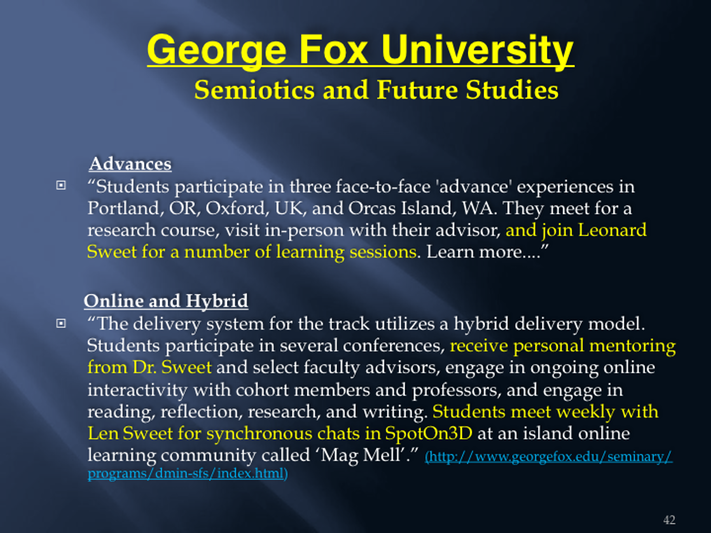
Students in this course “receive personal mentoring from Dr. Sweet.” Don’t let anyone convince you otherwise. Leonard Sweet “mentors” those who take this course and is an outlet for his Emerging Church ideas.
What does the Bible and the testimony of the Spirit have to say about end time movements and following after the religious world?
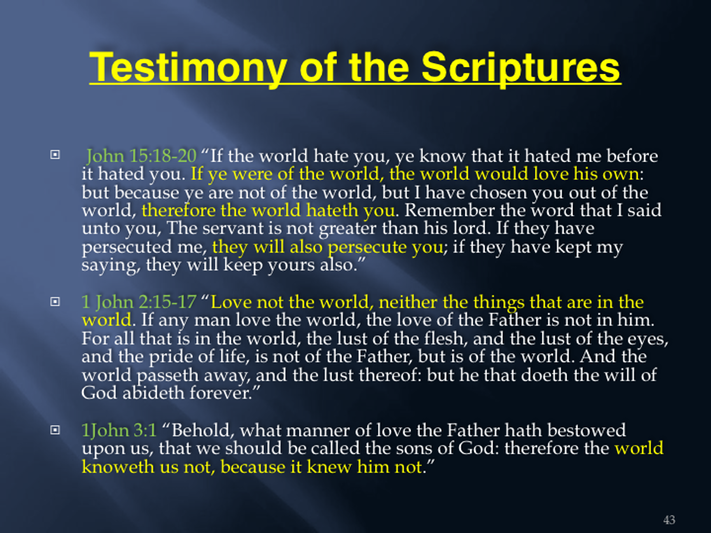
True followers of Christ, who love Him and obey Him and His ways laid out in the Scripture will not fit in with the world. They will reach out to the world, but will always be different.
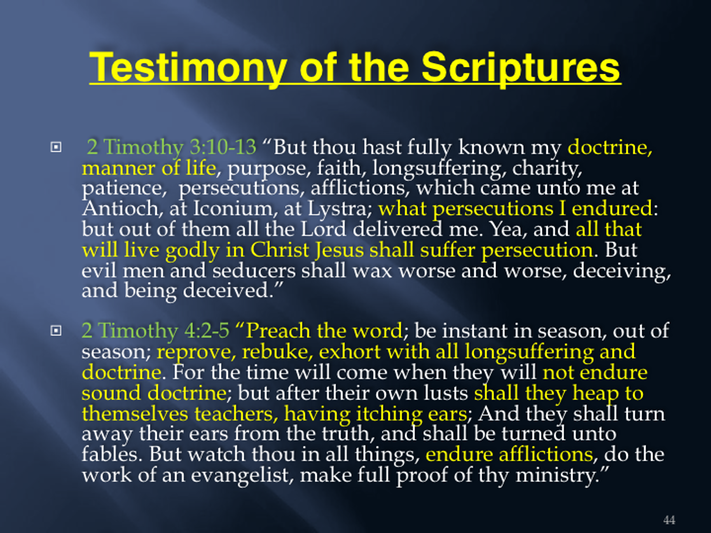
Doctrine and sharing that Doctrine are part of the great commission. But following that call will bring persecution. Jesus lasted only 3.5 years when he lived and preached the Word. Look at the lives of the apostles in Acts. They should be our example!
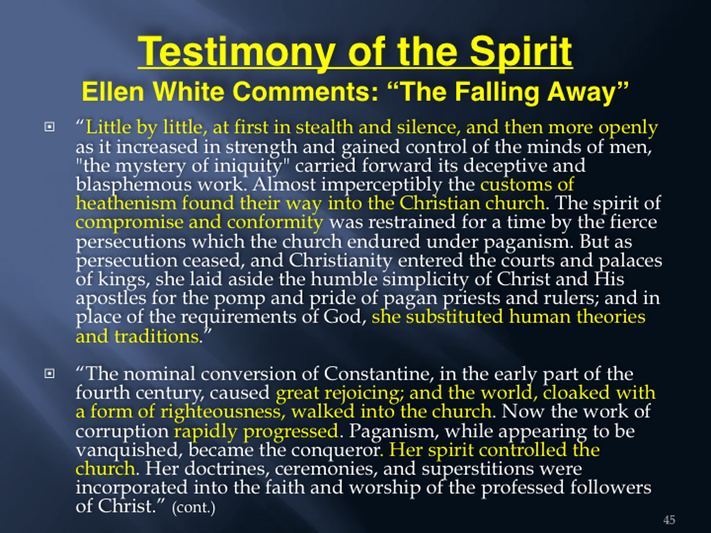
Speaking of the “falling away” that Paul wrote of in 2 Thess. 2:3-4, Ellen White has this to say about the fall of the early Christian church which ushered in the dark ages. According to Revelation that same ideology would arise again right before Christ 2nd coming. Is it happening now?
As Christian America enjoyed the freedom from persecution and then properity that came as a result, she has turned away from God to worldliness.
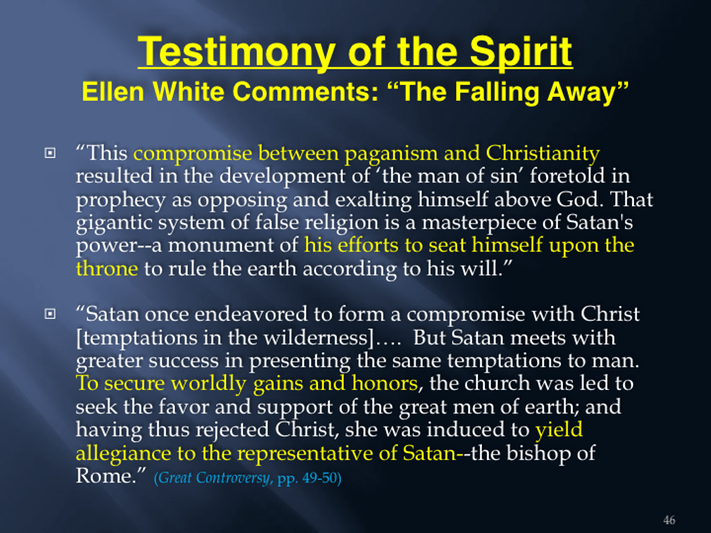
That same power, the book of Revelation tells us, will heal from its deadly wound and all the world will wonder after it. Is Christian America not now following in the same principles that lead to the downfall of Christianity in the days following the apostles, and getting into a position to support the image?
Why should we as Adventists be joining in this movement?
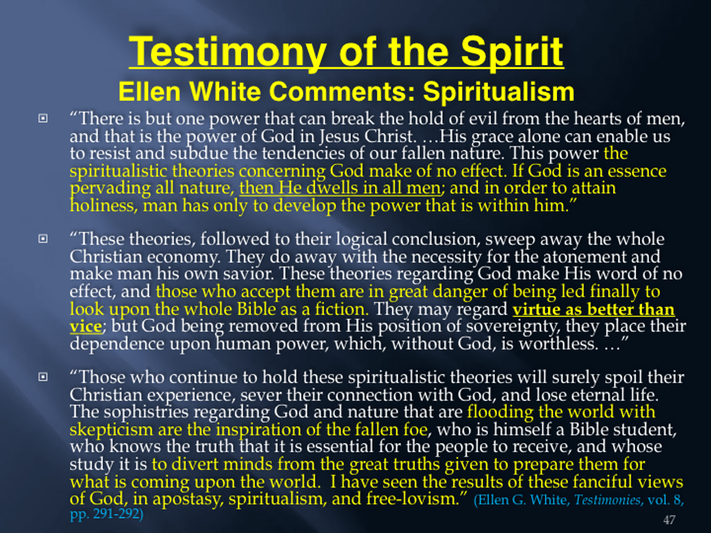
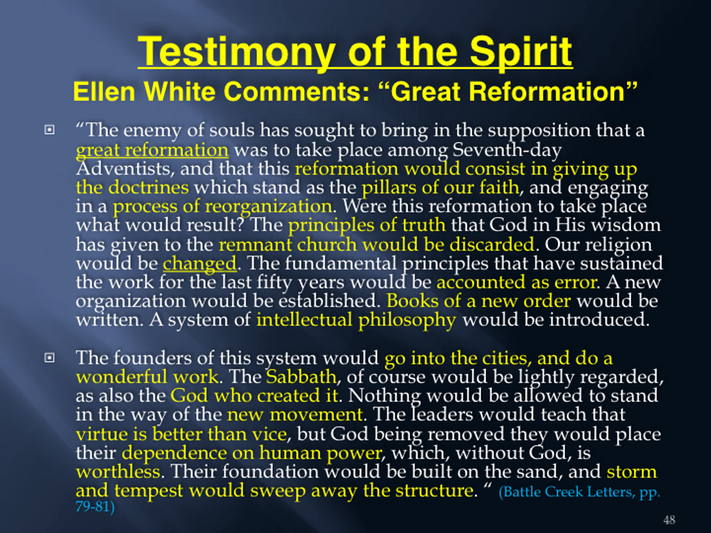
Written in a letter and in the context of the Kellogg pantheism issue (alpha). She just might be describing the Omega?
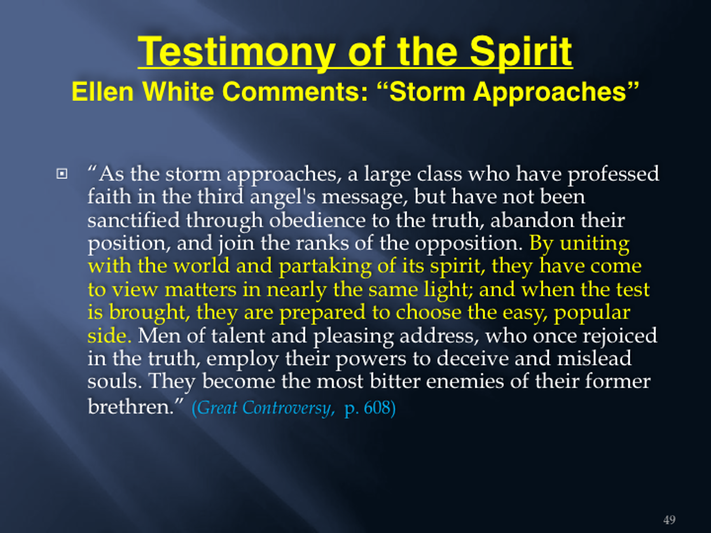
Now we will look at the influence Leonard Sweet has had on Adventism and The One Project!